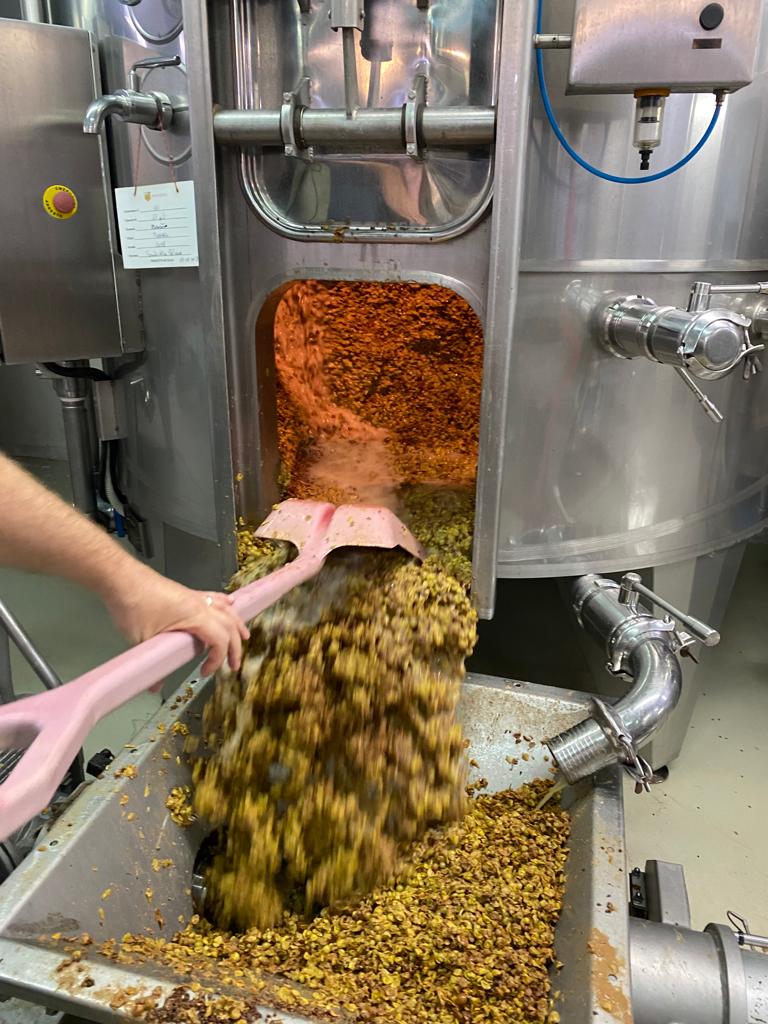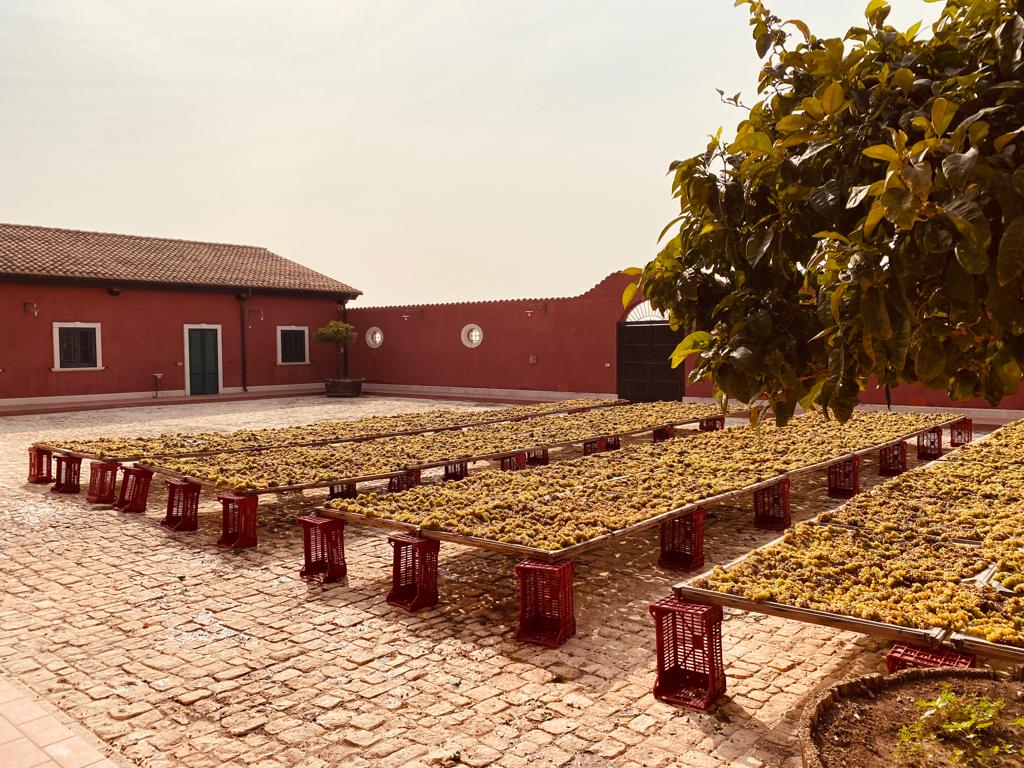My dear friend,
Here in Contrada Buonivini our work continues unabated: in the countryside the vineyards have begun to sprout, the green manures, that we had not seen so vigorous for years, have been chopped and buried and the preparation “500” has been given several times in the vineyards and in the olive groves.
However, I don’t want to talk to you about agriculture today. In fact, in the cellar we have finished bottling the white and rosé wines, as well as our sweet wine. For this reason, after several emails dedicated to our approach to the countryside, I would like to make a brief focus on these labels, some of which have undergone stylistic changes compared to their previous versions.
Let’s take Eureka, our Chardonnay. 2020 was bottled in January 2022, a wine that comes from two different plots, one cultivated on black alluvial soils and the other one on calcareous soils. The grapes fermented with their skins throughout the alcoholic fermentation, which lasted two weeks. Unlike past editions, the removal of lees was followed by 16 months of steel maturation. In fact, eureka has always been a wine that expressed its full potential one or two years after the harvest, evolving and increasing in complexity over time. The pandemic has slowed down sales and we have therefore decided to seize this opportunity by leaving it in the tank much more than before. We have now available a full-bodied wine, round but at the same time fresh, reactive, with great flavour. Generally, a more generous wine.

Rosa Nera is our rosé wine made from Nero d’Avola grapes. A wine obtained from four small plots all cultivated with “alberello impupato” (7,000 vines / hectare), each parcel is characterized by different soils, both calcareous and clayey. The grapes are harvested when are fully ripe and, after a direct pressing, the free-run must is left to ferment spontaneously. In the past, this operation has always taken place in steel tanks, but starting from harvest 2021 we decided to vinify the individual rosé plots separately, placing the must in wild cherry and ash barriques, where it underwent malolactic fermentation. This choice allowed us to give the wine greater complexity, structure and (hopefully) longevity. Rosa Nera has always been a rosé wine with a very fresh drink, with a tasty acid vein. By vinifying it in wood we have obtained a wider product without affecting too much its natural freshness, Rosa Nera 2021 is in fact a captivating cyclamen pink, characterized by elegant aromas, as delicate, fresh and salty as it is rich in fruity aromas. If we normally work with very low sulfur levels, its PH allowed us to put the product in the bottle with even more limited quantities of SO2.
Muscatedda 2021 is a wine that we have been producing since 2012, always obtained from vineyards facing west and a small part facing north (this exposure gives it more freshness). Since the first edition, we have never changed its style, because we think it can identify well with the expression of the white Muscat of our territory. A white wine obtained from well-ripened grapes grown on calcareous white soils which reflect the light and give the bunches sapidity and aroma, a wine that we vinify as a red one, keeping it in contact with the skins throughout the alcoholic fermentation. Muscatedda ages in steel until the spring which follows the harvest and is then bottled. This wine, unlike Eureka and Rosa Nera, has always expressed itself with particular intensity, in addition to the fact that despite being analytically less acid it always manages to amaze for its freshness: it is a tactile sensation also due to the presence of tannins (obtained with maceration) which amplify its astringency without ever scratching the palate. The harvest 2021, characterized by record heat, gave well-balanced grapes despite the temperatures reached, in fact, the wine presents intriguing citrus notes with a voluminous entry into the mouth and a good acid-saline balance.

Fondo alla Palma 2018, which has always been produced only with white muscat grapes, went on sale this spring. It is a wine obtained from a single plot on alluvial black soils, cultivated with “alberello impupato” (7,000 vines / hectare). The harvest 2018 was characterized by a warm climate since spring, the wine has been vinified as Muscatedda and then aged in barrique and mulberry half barriques for two years, followed by further refinement in the bottle. On these soils the white Muscat of Noto takes on different characteristics compared to the calcareous soils: here we find less aromatic contribution and greater structure and freshness. A white wine characterized by aromas of flowers and dehydrated fruit, when we taste it we find hints of ripe apricot and jasmine, which are immediately distinguishable, together with a roundness mitigated by dense but well-smoothed tannins. Two years after the harvest, its varietal aromaticity is softened and leaves room for different aromas, which are linked more to the territory than to the grape variety.
Finally, our Moscato della Torre 2021 as well went on the market this spring, a sweet wine obtained from vineyards facing west on white calcareous soils. The grapes were harvested at the same time as those of Muscatedda, in full ripeness in August, exactly on the hottest day of summer 2021, August the 11th. After harvesting, the grapes are placed manually from the collection boxes in the racks placed in our baily of white Modica stone which facilitates drying by reflecting light and giving heat to the grapes. After about ten days, the dried grapes are put back into crates, refreshed for two or three days in our cellars to be subsequently vinified with the skins in a steel tank; here the spontaneous fermentation lasts for a few days and then is inhibited by the use of cold that stops the fermentation. The wine obtained, once separated from the lees, matures in the tank until bottling. Moscato della Torre 2021 is a wine from dried grapes which bets everything on its elegance and on the balance between freshness and sugars, always maintaining a pleasant salty trail on the finish, never cloying (total sugars: 89 g / l). A sweet wine that, I believe, has a rare drinkability, always with an embracing softness.
See you soon.
Pierpaolo Messina
